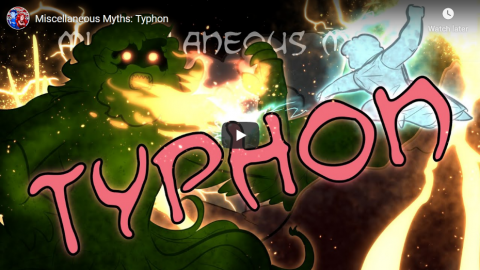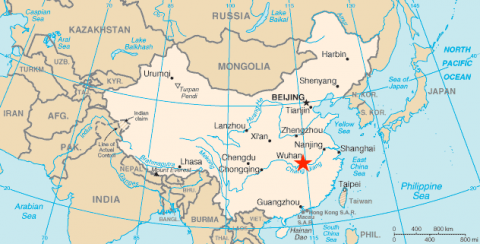Overly Sarcastic Productions
Published 17 Apr 2020Are you getting sick of Zeus? Are his constant antics getting you down? Do you wanna hear about the time he got his ass kicked by Godzilla?
Our content is intended for teenage audiences and up.
PATREON: https://www.Patreon.com/OSP
MERCH LINKS: https://www.redbubble.com/people/OSPY…
OUR WEBSITE: https://www.OverlySarcasticProductions.com
Find us on Twitter https://www.Twitter.com/OSPYouTube
Find us on Reddit https://www.Reddit.com/r/OSP/
Discord: https://discord.gg/h3AqJPe
April 18, 2020
Miscellaneous Myths: Typhon
Chairman Xi, the Wuhan Coronavirus, and the “Mandate of Heaven”
It is a little-known fact that no government can do anything, without the cooperation of its victims. Of course that cooperation may be obtained by force and falsehood, but there will always be a few people who won’t play along. This creates a “technical problem” for the tyrant, which can also be solved by violence and deceit, but in the heart of every dictatorship there must be calculations. At what point do so many people want us dead, that they will actually kill us?
This is a political calculation, and it can turn even a genocidal maniac into a thoughtful politician. A monstrously evil country, such as Red China, can be moderated in this way. Superficially, it may sometimes come to resemble a bourgeois, Westernized, rule-of-law state, like Japan, Taiwan, South Korea. It may, indeed must in its own interest, pretend to be benign. But under sufficient pressure it has only two choices. One is to be openly monstrous, with all the risks that entails; and the other is to disintegrate.
My interest has been piqued as a China-watcher. Recent events have been bringing that kettle back to the boil. That the Peking politburo has been making serious mistakes, we may observe. It could not possibly have intended the Batflu crisis, which its own malign incompetence brought about. But as it tries to manage the crisis, for its own purposes, the mistakes multiply. Even the people it had diligently bought — such as our progressive journalists, politicians, and businessmen — are turning against it.
Within China itself, the unthinking default loyalty of the masses, has been disturbed. “Narratives” which conflict with the official ones are circulating, along with the virus — and even among those who “test negative,” as it were. These are people who would never rebel, but they become sympathetic to rebels. Moreover, the state’s image of invincibility — the Mao/Xi portrait, a hundred feet tall — is cracking. Imagined lines of contempt appear in the plaster. Chairman Mao, of course, is dead, but Chairman Xi must be sensing his mortality.
As the Soviet Union was collapsing from within, progressive Westerners tried to ignore it. This wasn’t something they wanted to look at, which is why they were all taken by surprise. The fall of the Berlin Wall inwardly distressed everyone on the Left. For a few years their confidence was shaken, slowing their efforts to regroup around “environmentalism,” or some alternative leftwing cause, that wasn’t in shambles like socialism. But eventually their smugness recovered, and those revealed to have been absolutely wrong about everything they had ever told us, were able to resume their status as “experts.”
From Wikipedia‘s entry on the Mandate of Heaven:
The Mandate of Heaven (Chinese: 天命; pinyin: Tiānmìng; Wade–Giles: T’ien-ming, literally “Heaven’s will”) is a Chinese political and religious teaching used since ancient times to justify the rule of the King or Emperor of China. According to this belief, Heaven (天, Tian) — which embodies the natural order and will of the universe — bestows the mandate on a just ruler of China, the “Son of Heaven” of the “Celestial Empire”. If a ruler was overthrown, this was interpreted as an indication that the ruler was unworthy, and had lost the mandate. It was also a common belief that natural disasters such as famine and flood were divine retributions bearing signs of Heaven’s displeasure with the ruler, so there would often be revolts following major disasters as the people saw these calamities as signs that the Mandate of Heaven had been withdrawn.
[…] The Mandate of Heaven was often invoked by philosophers and scholars in China as a way to curtail the abuse of power by the ruler, in a system that had few other checks. Chinese historians interpreted a successful revolt as evidence that Heaven had withdrawn its mandate from the ruler. Throughout Chinese history, times of poverty and natural disasters were often taken as signs that heaven considered the incumbent ruler unjust and thus in need of replacement.
What makes a handplane good or bad?
Rex Krueger
Published 13 Mar 2019More video and exclusive content: http://www.patreon.com/rexkrueger
Get the FREE Tip Sheet: https://www.rexkrueger.com/articles/2…
Tools and Materials in this Video (affiliate; scroll for more) || Stanley 12-404 plane : https://amzn.to/2Ty8Dq8Follow me on Instagram: @rexkrueger
Get my wood turning book: http://www.rexkrueger.com/book
QotD: Distorting the history of science
The most frequently assigned book on science in universities (aside from a popular biology textbook) is Thomas Kuhn’s The Structure of Scientific Revolutions. That 1962 classic is commonly interpreted as showing that science does not converge on the truth but merely busies itself with solving puzzles before lurching to some new paradigm that renders its previous theories obsolete; indeed, unintelligible. Though Kuhn himself disavowed that nihilist interpretation, it has become the conventional wisdom among many intellectuals. A critic from a major magazine once explained to me that the art world no longer considers whether works of art are “beautiful” for the same reason that scientists no longer consider whether theories are “true.” He seemed genuinely surprised when I corrected him.
The historian of science David Wootton has remarked on the mores of his own field: “In the years since Snow’s lecture the two-cultures problem has deepened; history of science, far from serving as a bridge between the arts and sciences, nowadays offers the scientists a picture of themselves that most of them cannot recognize.” That is because many historians of science consider it naïve to treat science as the pursuit of true explanations of the world. The result is like a report of a basketball game by a dance critic who is not allowed to say that the players are trying to throw the ball through the hoop.
Many scholars in “science studies” devote their careers to recondite analyses of how the whole institution is just a pretext for oppression. An example is a 2016 article on the world’s most pressing challenge, titled “Glaciers, Gender, and Science: A Feminist Glaciology Framework for Global Environmental Change Research,” which sought to generate a “robust analysis of gender, power, and epistemologies in dynamic social-ecological systems, thereby leading to more just and equitable science and human-ice interactions.”
More insidious than the ferreting out of ever more cryptic forms of racism and sexism is a demonization campaign that impugns science (together with the rest of the Enlightenment) for crimes that are as old as civilization, including racism, slavery, conquest, and genocide.
This was a major theme of the Critical Theory of the Frankfurt School, the quasi-Marxist movement originated by Theodor Adorno and Max Horkheimer, who proclaimed that “the fully enlightened earth radiates disaster triumphant.” It also figures in the works of postmodernist theorists such as Michel Foucault, who argued that the Holocaust was the inevitable culmination of a “bio-politics” that began with the Enlightenment, when science and rational governance exerted increasing power over people’s lives. In a similar vein, the sociologist Zygmunt Bauman blamed the Holocaust on the Enlightenment ideal to “remake the society, force it to conform to an overall, scientifically conceived plan.”
In this twisted narrative, the Nazis themselves are somehow let off the hook (“It’s modernity’s fault!”). Though Critical Theory and postmodernism avoid “scientistic” methods such as quantification and systematic chronology, the facts suggest that they have the history backwards. Genocide and autocracy were ubiquitous in premodern times, and they decreased, not increased, as science and liberal Enlightenment values became increasingly influential after World War II.
Steven Pinker, “The Intellectual War on Science”, Chronicle of Higher Education, 2018-02-13.






